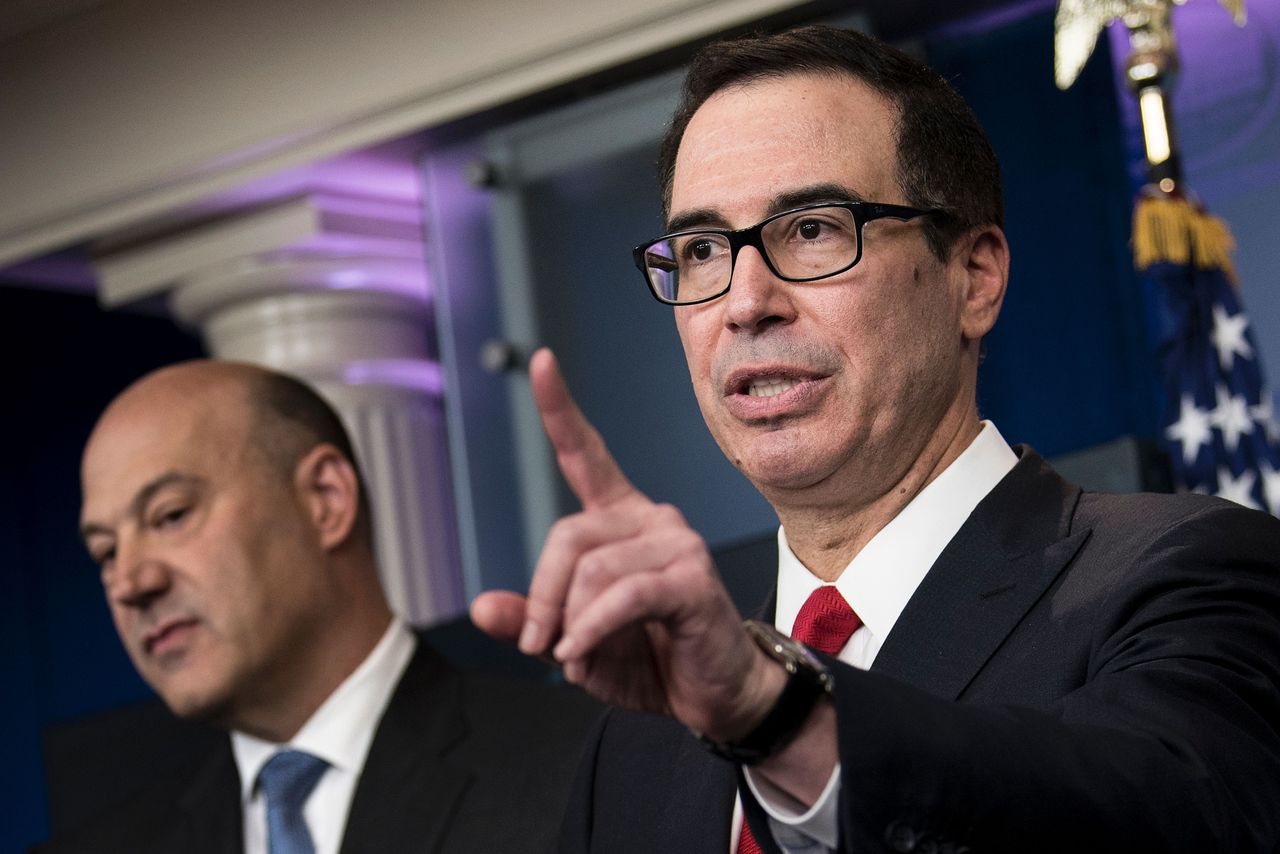Republicans want to cut the wrong taxes
Rich people don't need a tax cut. Poor people do.


With ObamaCare repeal on the backburner, the GOP is firing up some tax cuts.
The White House and Republicans in Congress hope to introduce a tax reform bill in September. The details are still in flux, but four key components of the plan are emerging: Cut the tax rate on corporate profits, align the so-called "pass through" business tax rate with the new corporate rate, lower individual income tax rates, and increase the standard deduction.
Now, tax cuts have become so central to Republicans' agenda that it's easy to caricature them as an obsession. But the real problem with this plan isn't the desire for cuts, per se; it's where the Republicans are aiming them.
Subscribe to The Week
Escape your echo chamber. Get the facts behind the news, plus analysis from multiple perspectives.

Sign up for The Week's Free Newsletters
From our morning news briefing to a weekly Good News Newsletter, get the best of The Week delivered directly to your inbox.
From our morning news briefing to a weekly Good News Newsletter, get the best of The Week delivered directly to your inbox.
As I've written plenty of times before, the deficit fears often deployed against tax cuts by centrist Democrats are profoundly misguided and deeply destructive. The federal government is a unique economic entity, because it controls the currency supply. So another objection to tax cuts — that they defund valuable public services — doesn't necessarily hold for similar reasons.
The real problem with the GOP's proposed tax cuts is who benefits: Cutting the tax rate on corporate profits showers money on wealthy shareholders. Aligning the "pass through" tax rate with a lower corporate rate will allow wealthy Americans to rejigger their tax filings, paying lower rates than their less fortunate fellow citizens. While Republicans want to lower income tax rates across the board, the bulk of the benefits from their plans go to Americans pulling down six-figure salaries or more. Increasing the standard deduction is really the only part of this plan that has any sort of populist tilt.
Frankly, a lot of this probably boils down to the GOP's loyalty to their wealthy donor class. But in fairness, Republicans also make an economic case for these changes: that corporate and small business taxes discourage investment and job creation, thus harming workers. And that the income tax discourages work, thus dragging down economic growth.
But even a quick glance at the economic data blows up this narrative. Corporations are seeing record profits already, but these aren't translating into wage hikes for workers. The 1 percent have gobbled up nearly all the new income the economy has generated since the Great Recession, and worker compensation has not kept up with productivity growth for decades. In fact, all the problems faced by the post-2008 economy — low productivity growth, low inflation, low interest rates, and low labor force participation — can be explained by a massive and chronic shortfall in aggregate demand.
The way you fix aggregate demand is not by giving more money to corporations, wealthy shareholders, and the people who pay the top income tax rate. You fix it by putting more money into the pocketbooks of the poor and working class. For millions of Americans, being able to keep a few extra thousands of dollars each year can make a huge difference in their lives — not to mention in their consumption.
There are plenty of tax cuts that could do this.
First off, rather than cutting the income tax rate from the top down, cut it from the bottom up. You have to make at least $418,400 to pay the top income tax rate of 39.6 percent. There's no need to cut that. But the tax rates on the lower brackets could certainly be cut. And instead of reducing the number of income tax brackets, Republicans should increase them — that would allow them to target tax relief at the poor and working class with greater precision.
Republicans could also expand the use of tax credits. The Earned Income Tax Credit (EITC), for example, relieves some of the income tax burden on low-income Americans. It's also refundable, meaning it effectively boosts take-home pay for many people. The problem is, it's not generous enough and it's very hard for workers without children to qualify. Both the size of the credit and its eligibility need to be dramatically expanded.
Then there's the child tax credit (CTC). It does the same thing as the EITC, but for Americans with children. Unfortunately, it's only refundable in some instances. It's also not terribly generous, and it's designed in such a way that the poorest families actually get no benefit from it at all. So the CTC is also ripe for reform and expansion.
Finally, there's the payroll tax. This is actually the biggest tax burden on most working Americans — far more so than the individual income tax. Workers pay 6.2 percent out of their wages for the payroll tax. Republicans could easily cut that by a few percentage points and instantly boost the take-home pay for millions. They could also make the EITC and the CTC applicable to Americans' payroll tax liability, not just their income tax liability — an idea already floated by Sens. Mike Lee (R-Utah) and Marco Rubio (R-Fla.).
Some of these ideas have been floating around in reformist conservative circles for a while now. But the Republicans have never taken them up with anything close to the necessary ambition or enthusiasm. The size of the increase needed for the EITC and CTC, for example, is well beyond anything contemplated by even the fringes of the party. The proposals also tend to get undermined by the party's obsession with cutting the welfare state — so even as Republicans give to Americans with one hand, they take from them with the other.
But the Republicans could shift gears and make cutting taxes for the poor and working class the centerpiece of their agenda. That would go a long way towards fulfilling President Trump's so-far empty promise of making the GOP a workers' party.
Sign up for Today's Best Articles in your inbox
A free daily email with the biggest news stories of the day – and the best features from TheWeek.com
Jeff Spross was the economics and business correspondent at TheWeek.com. He was previously a reporter at ThinkProgress.
-
 North Korea may have just pulled off the world's biggest heist
North Korea may have just pulled off the world's biggest heistUnder the Radar Hermit kingdom increasingly targets vulnerable cryptocurrency, using cybercrime to boost battered economy and fund weapons programmes
By Harriet Marsden, The Week UK Published
-
 Today's political cartoons - March 2, 2025
Today's political cartoons - March 2, 2025Cartoons Sunday's cartoons - world domination, fantasy dominion, and more
By The Week US Published
-
 5 dangerously funny cartoons about air travel
5 dangerously funny cartoons about air travelCartoons Artists take on fees, fears, and more
By The Week US Published
-
 'Seriously, not literally': how should the world take Donald Trump?
'Seriously, not literally': how should the world take Donald Trump?Today's big question White House rhetoric and reality look likely to become increasingly blurred
By Sorcha Bradley, The Week UK Published
-
 Will Trump's 'madman' strategy pay off?
Will Trump's 'madman' strategy pay off?Today's Big Question Incoming US president likes to seem unpredictable but, this time round, world leaders could be wise to his playbook
By Sorcha Bradley, The Week UK Published
-
 US election: who the billionaires are backing
US election: who the billionaires are backingThe Explainer More have endorsed Kamala Harris than Donald Trump, but among the 'ultra-rich' the split is more even
By Harriet Marsden, The Week UK Published
-
 US election: where things stand with one week to go
US election: where things stand with one week to goThe Explainer Harris' lead in the polls has been narrowing in Trump's favour, but her campaign remains 'cautiously optimistic'
By Harriet Marsden, The Week UK Published
-
 Is Trump okay?
Is Trump okay?Today's Big Question Former president's mental fitness and alleged cognitive decline firmly back in the spotlight after 'bizarre' town hall event
By Harriet Marsden, The Week UK Published
-
 The life and times of Kamala Harris
The life and times of Kamala HarrisThe Explainer The vice-president is narrowly leading the race to become the next US president. How did she get to where she is now?
By The Week UK Published
-
 Will 'weirdly civil' VP debate move dial in US election?
Will 'weirdly civil' VP debate move dial in US election?Today's Big Question 'Diametrically opposed' candidates showed 'a lot of commonality' on some issues, but offered competing visions for America's future and democracy
By Harriet Marsden, The Week UK Published
-
 1 of 6 'Trump Train' drivers liable in Biden bus blockade
1 of 6 'Trump Train' drivers liable in Biden bus blockadeSpeed Read Only one of the accused was found liable in the case concerning the deliberate slowing of a 2020 Biden campaign bus
By Peter Weber, The Week US Published